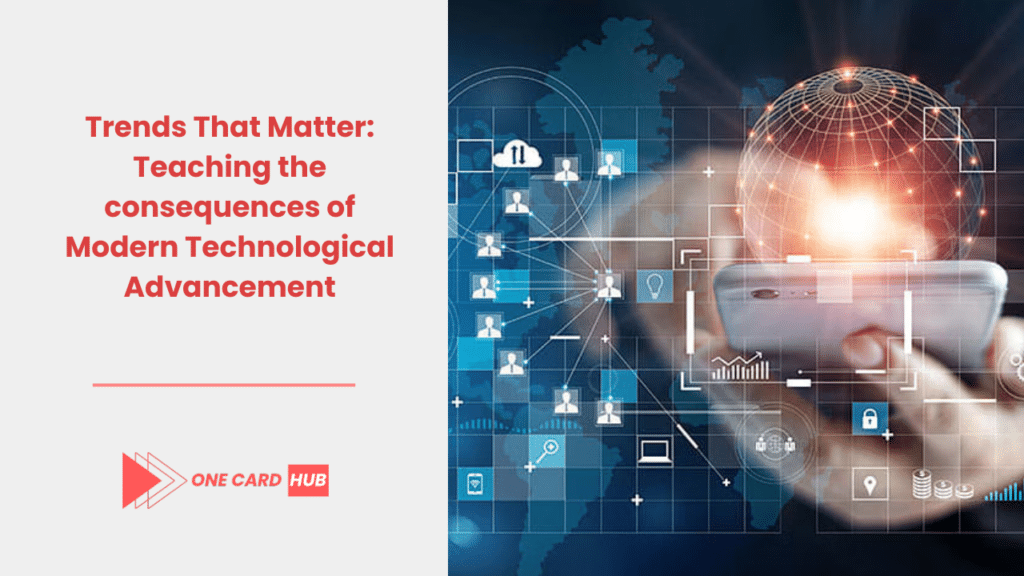
Trends That Matter: Teaching the consequences of Modern Technological Advancement

At the fast moving technological wave, it's a critical consideration for individuals and business leaders, and policymakers to determine what trends will see the society and the economy transformation. The future is progressing at an incredibly fast pace, and as we peer into the technological shifts around us, we will realize that it is not only the way we live and work that is changing; rather, - this is also social fabric that is being altered. Over here we have a look on the most important that happening now, and their role in making these changes tremendous.
Artificial Intelligence (AI) and Automation: The redistribution of job responsibilities and tasks on a grand scale.
AI and automation are the main technological changes that have become predominant and now can shift the entire industries relying on them thus improving their efficiencies, productivities, and innovations. However, the future of these technologies involves mechanization, which is not only aimed at decreasing the duration of operations but also opens up new opportunities. However, there is a challenge that this will come with, such as workforce displacement and the need for re-skilling. The development of AI and automation is not only limited to the economic concepts, but it also has a scope of social structures and requires reconsideration of concepts of workforce, education systems and social security net.
Internet of Things (IoT): : Increasing the Communicative Function and the Intelligent Level of our Life
The Internet of Things phenomenon is already linking billions of devices from modern mobile devices to rather simple refrigerators and cooking facilities this way we are
creating the integrated data and communication network without any technical limitations. Through the close links it provides, smart cities automatically gain cutting edge capabilities such as urban planning, learning and empathy, especially in the major cities of which the quality of life improves a lot. While this aspect has many benefits, it yet gets to the heart of privacy, security, and digital divide as disparity in these technologies become another dimension of social inequality.
Blockchain and Cryptocurrency: Basing on the foundations of trust and transactions.
Blockchain technology and crypto currencies are bringing into question the financial systems and the idea of trust as they are disruptive and causing a lot of concerns. These smart technologies allow for the elimination of intermediaries by offering a secure decentralized venue for trading and contracts, enhancing the alternatives to existent institutions and systems. Global financial system, supply chain management, and digital identities are incredible responsible for this. This technological development could enhance transparency and eliminate fraud, thereby improving lives of individuals. Although regulatory, scalability and adoption problems are the major hindering issues to fully incorporate the technologies.
Renewable Energy Technologies: Engaging the Green Power to Endure a Sustainable Future.
The big shift toward renewable energy technologies is a necessary one as we combat climate change. Solar, wind, among other greener options are being developed and made more affordable in the next years, showcasing a clear path towards a cleaner more sustainable energy future. While this period of change affects only the policies related to the environment, it has the capacity to radically reshape the global energy markets, politics, and social justice since access to clean energy will be seen as the principal factor in sustainable development.
Quantum Computing: Weakening the bounds of gravity.
While classical computers are limited in solving intractable complex problems, quantum computing promises that. Their range of application stretches from drug discovery to climate modeling and more. Just though in its initial stages of development, the power of quantum computing for domains such as cryptography, materials science, and optimization is incomparable. With the progress in research, souring the problems of scalability, error rates and practical applications is a critical step in the way of full exploitation of the enormous potential that AI capabilities has.
Digital Health Innovations: Severing the delivery process at a single point and instead, creating a gateway between the flowing health care system and the clients.
Digital health innovations for example, are reshaping the healthcare sector completely: these are telemedicine, wearable devices, and AI-driven diagnostics, among others. IT becomes the underlying basis of the more holistic, efficient, and patient-centered care, quality of which is getting higher and the costs of which is getting lower. Besides, these data do raise some issues of privacy, fairness, and value of technology in patient-doctor communications. Last but not least, digitalizing is a sort of transition that goes far beyond digital tools or systems - we witnessed it in all spheres of our life, such as economy, governance, privacy, and even humanity. Along with these changes, it is crucial for humans to adopt an equilibrium solution— one that provides benefits of innovation as well as deals with the ethics, social, and economic issues these innovations may generate. Conducting real, open debates about how the technology develops in the future and its effect on the society is important since it will help to guarantee that these trends are beneficial not only the few but also to the whole community.
Augmented Reality (AR) and Virtual Reality (VR): Changing up The Process
AR and VR are becoming a pervasive force in all sectors of humanity from entertainment through to education and workplaces by merging digitally displayed content with the real world. Such tools are pretty capable of changing the notion of training and the likes, for instance, collaboration in distant locales and consumer interaction. AR and VR technology is being more complex and more available which implies that digital wellness is a problem and inclusive experiences which are created with this technology are more and more improbable to become ones that result in real-world interactions like a replacement.
5G Networks: Accelerating Connectivity
The next generation of the cellular networks, namely 5G, is supposed to be rolled out globally, entailing faster, more reliable and stable internet with significantly lower latency. Such a technological breakthrough makes the unlimited growth of IoT devices possible, it provides better AR and VR immersion and it supports different services and applications that need to be run in a real time and with a strong level of data security. The advent of the fifth generation technology poses concerns such as infrastructure equity, cybersecurity risks, and et cetera that may be associated with the intensification of digital networks.
Genomic and Biotechnologies: In the future, precision or personalized medicine will play an increasingly vital role in preventing and treating diseases.
Genomics and biotechnology advances now make it possible to practice medicine differently, using treatments and interventions chosen based on the individual's unique genes. These technologies may be the breakthrough that can be used to solve many health problems and diseases and thus may own the status of a turning point for the healthcare field and stop time. Nevertheless ethics are a core issue, privacy is also important and last but not least the lack of the boundaries between wealth and health care.
Genomic and Biotechnologies: In the future, precision or personalized medicine will play an increasingly vital role in preventing and treating diseases.
Genomics and biotechnology advances now make it possible to practice medicine differently, using treatments and interventions chosen based on the individual's unique genes. These technologies may be the breakthrough that can be used to solve many health problems and diseases and thus may own the status of a turning point for the healthcare field and stop time. Nevertheless ethics are a core issue, privacy is also important and last but not least the lack of the boundaries between wealth and health care.
Sustainable Technologies: The green economy is a critical component of the transition process.
In response to the crisis of environmental sustainability, the research, engineering, and commercialization of technologies are being carried out which can mitigate waste, reduce energy usage, and alleviate the impact of climate change. From carbon the vacuum once used will require purification, which also puts the habitat at risk of contamination. The hurdle of the scale of these way of solutions, absence of economic and regulatory regulations, and fairness and adequate inclusion can be considered as the challenges of the transition path to a sustainable economy.
AI Ethics and Governance: The moral quandary is to the troupe with the ethical dilemma.
AI technologies are now playing significant role in automated decision-making in processes based health care, justice, and other sectors. These raises the need for all the
more ethical AI and govern model. The ethics principles of AI comprise of the concepts that are important including bias, accountability, and transparency of the algorithms. Despite the fact that, designing and policy formation for use of AI technologies in a legitimate manner, and for the benefit of the society continue to be a challenge.
The Future of Education: In The Digital Age’s Context.
Technological innovations are reshaping the educational sphere by way of providing specialized learning experiences, virtual study halls, and library access to the vast pool of knowledge. Although in this case this shift also shows the digital gap issue, and the need for education which is inclusive and will provide an equal access to technology and qualitative education for all people. Informing students for a future that technologically dominates all aspects of life requires education system reform to include critical thinking, creativity and self-learning skills.The technological revolution that is ongoing today has a high potential to radically redefine the societal norms, economy and individuals' lives. Engaging in the modifications from these innovations through careful consideration and mitigation of the consequences and risks is essential as we strive to tap technology for our betterment. Collaboration among governments, industries and communities should be given special recognition while framing a future that is under the umbrella of innovation with a singular aim of providing equity, sustainability and ample outcomes for all. This technological environment with its ethical interventions and humane considerations is complicated and so it is important to adopt a proactive and thoughtful attitude as you maneuver amidst the blades of this technological advancement.
Augmented Reality (AR) and Virtual Reality (VR): We Do Not Know How to Sense and This Makes What We Know to be Reality More Concealed.
AR and VR technologies are revolutionizing entertainment, education and workspace through the offer of thorough immersive experiences in a crossbreed physical and digital worlds. Through these technologies, training and simulation, collaboration via remote stations and consumer interaction along with the established ways of interaction may be improved by offering new ways to interact with information and with each other. As we find ourselves more and more immersed in Augmented and Virtual Reality the challenge will be to to create a balance between these technologies binging us closer together, and them creating digital divides.
Cybersecurity: We shall be caring about our digital future.
Feu que nous avons sur digital technologies amount a producer pasty cybersecurity. The greater amount of complexity of the cyber threats, cyber security becomes the
problems for individuals, business and even states. The guarding of digital assets, personal information, as well as critical infrastructure calls for the insurgence of new security techniques in cyber space, and also, joint ventures involving governments, industries, and stakeholders in the society at large. Answering cybersecurity challenges is crucial for creating a confidence in digital systems and verifying the got choice procurement of technology by everyone.
The Ethics of AI and Technology Use: The Difficult Dynamic
The ethical issues of the AI and upcoming tech-driven areas compel us to have a good look at privacy, impartiality, efficiency, and the human dignity. With AI systems
becoming more ubiquitous in the realm of decision making, supervisory mechanisms are very much required to prevent abuse. These include the inclusion of fair practices in the design of artificial intelligence algorithms, the mitigation of misuse risks of big data and the consequences of social automation in the future. Participating in the ethical discussions, building effective governance structure and more, are the main things, they help us to find our way through such moral dilemmas.
Lifelong Learning and the effects of educational technology in Education in the future.
Technological Revolution is the primary driver of the team, which demands a transition to lifelong learning. Probably, education that will prevail will emphasize on the skills which involve creativity, adaptability, and empathy along with technical knowledge. The innovations related to educational technology (EdTech) are increasing the availability and personalization of education but there are some obstacles to overcome, such as inequality in access again and the ill effects of the digital divide. Learning that will be constructed all throughout the future will necessitate adoption of systemic educational policy and program implementees.
Space Exploration and Commercialization: Driving Our Progress
Frontier space is turning to be less alien as it becomes increasingly available due to the new technologies and space companies that are becoming more prevalent and booming in the commercial space world. The future of space exploration is filled with great expectations- serious scientific discoveries and new economic potential as well as an increased knowledge of the cosmos’s complicatedness. On the other hand, it raises the questions such as: “Who governs space?” , “What are the consequences to the environment,” and also “Who are the beneficiaries of the space-derived goods/services?” Need to deal with ethics, laws and practical matters on space commercialize will be crucial as humans decide to explore space beyond Earth.The unpredictable consequences brought due to technology shift are enough to disturb turning the very basis of everything we have been doing in the past. From altering the way we interact with our surroundings to imposing a new paradigm on various industries, age-long practices are facing challenges, and there is much to ponder over and given solutions to. Innovation through embracement, the ethical target predilection and the dialogue fostering shall help us deal with the changes in a way that boosts society and the planet's welfare. The future is our collective gallery where we absorb and uncover new ideas and creations. It is us working together to create a world that not only has the highest aspirations, but is also built by us to match these aspirations and dreams.
FAQ: Navigating Technological Shifts
1: The considerations of whether AR and VR are modifying the way we learn and use are necessary.
The imagination is being transformed by AR and VR advancement by offering rich interactive which leads to intensive engagement and comprehension. They support modeling education through computerized simulations, provide companies with a platform for distant collaboration, and enhance the shopping experience for the users in consumer markets. The difficulty is in utilizing the technology with such potential in a manner that facilitates the deepening of human relationships instead of creating digital isolation.
2: The importance of cybersecurity today occurs against the background of emerging threats, cybercrimes, and the ever-increasing reliance on information technology.
Digital immersion comes along with the outbreak and diffusion of cyber threat. Cyber defense is important for the securing both individual information, company statistics and the safety of the country. Advancements in cybersecurity assessment tools and joint activities should take a leading role in protecting against the ever-evolving cyber crime and retain the trust of digital systems.
3: Apart from ethical concerns, AI and technology use at the workplace also raise many questions.
Ethical issues come to view with loss of privacy, algorithmic biases, lack of responsibility for AI decisions and potential denial of humane interactions in society. This concern, however, calls for developing and implementing ethical AI usage, making transparency, fairness and human dignity the major issues.
4: How has lifetime learning impacted the development of our future?
The acceleration of the process of technological change-making for lifetime learning which competency is to learn new skills and knowledge. A future in education is competing for today’s essential skills such as adaptability, critical thinking and emotional intelligence. Challenges consist of providing equal chances to study and developing education flexibilities which will suit both young and old to have a lifelong learning.
5: What is the result of people trading in space?
The prospects of growing the industry are in the scientific, economic, and explorative potentials (including space commercialization). On the contrary, it presents the problems of space administration, environmental influence, and everyone around space escapade to the lead. In order to move space activities to the next level, involving these challenges must be seen as serious and adequate solutions has to be dealt with.
6: Is it possible to keep an eye on the technological trends in the market and make the right choices?
The technology advancement call for a permanent updating of the knowledge, making investments in continuous learning and skill development, and the adoption of outdoor, flexible and adaptive approaches is a constant need. A business must be innovative and make sure ethic is associated with the use of technology.
The imagination is being transformed by AR and VR advancement by offering rich interactive which leads to intensive engagement and comprehension. They support modeling education through computerized simulations, provide companies with a platform for distant collaboration, and enhance the shopping experience for the users in consumer markets. The difficulty is in utilizing the technology with such potential in a manner that facilitates the deepening of human relationships instead of creating digital isolation.
2: The importance of cybersecurity today occurs against the background of emerging threats, cybercrimes, and the ever-increasing reliance on information technology.
Digital immersion comes along with the outbreak and diffusion of cyber threat. Cyber defense is important for the securing both individual information, company statistics and the safety of the country. Advancements in cybersecurity assessment tools and joint activities should take a leading role in protecting against the ever-evolving cyber crime and retain the trust of digital systems.
3: Apart from ethical concerns, AI and technology use at the workplace also raise many questions.
Ethical issues come to view with loss of privacy, algorithmic biases, lack of responsibility for AI decisions and potential denial of humane interactions in society. This concern, however, calls for developing and implementing ethical AI usage, making transparency, fairness and human dignity the major issues.
4: How has lifetime learning impacted the development of our future?
The acceleration of the process of technological change-making for lifetime learning which competency is to learn new skills and knowledge. A future in education is competing for today’s essential skills such as adaptability, critical thinking and emotional intelligence. Challenges consist of providing equal chances to study and developing education flexibilities which will suit both young and old to have a lifelong learning.
5: What is the result of people trading in space?
The prospects of growing the industry are in the scientific, economic, and explorative potentials (including space commercialization). On the contrary, it presents the problems of space administration, environmental influence, and everyone around space escapade to the lead. In order to move space activities to the next level, involving these challenges must be seen as serious and adequate solutions has to be dealt with.
6: Is it possible to keep an eye on the technological trends in the market and make the right choices?
The technology advancement call for a permanent updating of the knowledge, making investments in continuous learning and skill development, and the adoption of outdoor, flexible and adaptive approaches is a constant need. A business must be innovative and make sure ethic is associated with the use of technology.






Related posts